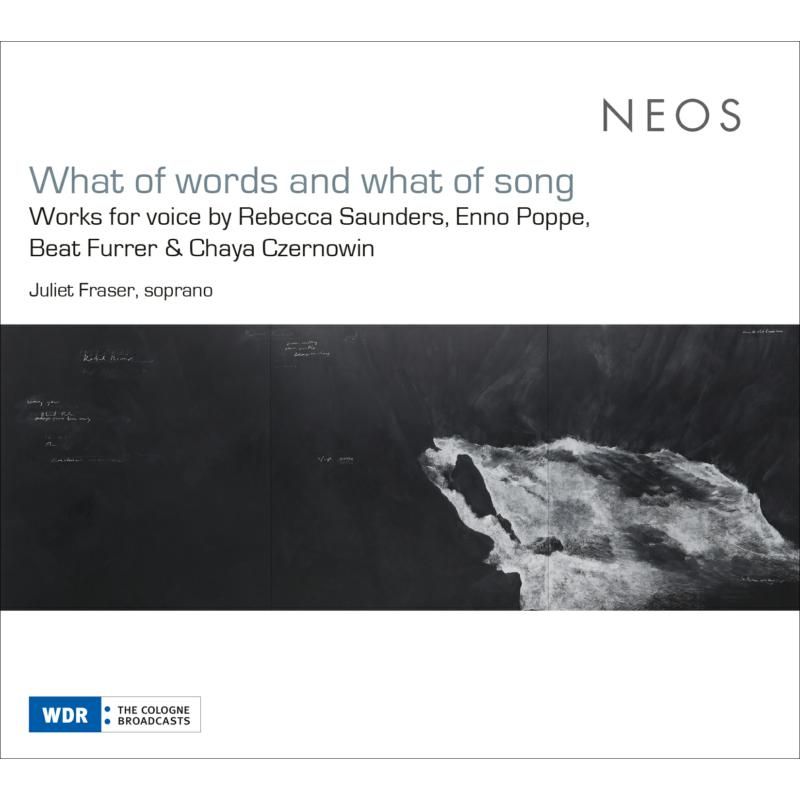Juliet Fraser: What of Words and What of Song
View record and artist detailsRecord and Artist Details
Genre:
Vocal
Label: Neos
Magazine Review Date: 09/2023
Media Format: CD or Download
Media Runtime: 62
Mastering:
DDD
Catalogue Number: NEOS12226

Tracks:
| Composition | Artist Credit |
|---|---|
| Adiantum Capillus-Veneris I |
Chaya Czernowin, Composer
Juliet Fraser, Soprano |
| Lotófagos |
Beat Furrer, Composer
Juliet Fraser, Soprano Uli Fussenegger, Double bass |
| Spazio Immergente I |
Beat Furrer, Composer
Juliet Fraser, Soprano Mikael Rudolfsson, Trombone |
| Wespe |
Enno Poppe, Composer
Juliet Fraser, Soprano |
| O |
Rebecca Saunders, Composer
Juliet Fraser, Soprano |
| O Yes & I |
Rebecca Saunders, Composer
Helen Bledsoe, Bass flute Juliet Fraser, Soprano |
Author: Liam Cagney
At a difficult time for UK new music (the much-loved contemporary ensemble Psappha depressingly having taken the decision to close following its funding being withdrawn), what a welcome relief this album is, the engrossing solo debut by Juliet Fraser, one of England’s premiere contemporary musicians. All the better that it opens with music as uncompromisingly out-there as Rebecca Saunders’s O.
In O, Juliet Fraser sings and chants and whispers and hums; her voice is a flickering candle against pitch darkness. The text comprises fragments of Molly Bloom’s soliloquy from Ulysses, blitzed Beckett-style to become mostly unrecognisable. Fraser is a foremost interpreter of Saunders’s music, and the extended vocal techniques render her voice strange: at one point, when her lips and tongue fire out vowel-less syllables, the voice sounds like a click-clacking clarinet; at another point, trilling at the top of her range with mouth closed, her voice sounds amphibious. A sister work here, O Yes & I, where Fraser is accompanied by bass flute, has a similar idiom but even fierier mood.
Enno Poppe’s Wespe sets a poem by Marcel Beyer in which a wasp flies into someone’s mouth and bounds around their body. Poppe appropriately renders the voice an erratic buzzing insect, all melismata and glissandos, Fraser making of it a puckish drama. Also referencing the natural world, Chaya Czernowin’s Adiantum Capillus-Veneris I (named after a type of fern) is subtitled ‘a study in fragility’, and the music masterfully explores unpitched noise. Fraser’s inhalation/exhalation pattern becomes like a duo, pitched sound followed by breathed sound, two entities communicating.
Artistic modernism – thank God, still an ongoing concern – often invokes a return to the primeval. Beat Furrer’s Lotófagos (2006) for soprano and double bass is named after the Lotus Eaters of Ancient Greek myth. Its opening is based on quietly undulating semitone shifts; as the material develops, Fraser’s voice rises in register and becomes declamatory. The double bass’s growling double-stops contrast with the soprano’s high cries, the one a deep marine and the other avian. Pleasingly, a disc that opens with Ulysses closes with The Odyssey.
Discover the world's largest classical music catalogue with Presto Music.

Gramophone Digital Club
- Digital Edition
- Digital Archive
- Reviews Database
- Full website access
From £8.75 / month
Subscribe
Gramophone Full Club
- Print Edition
- Digital Edition
- Digital Archive
- Reviews Database
- Full website access
From £11.00 / month
Subscribe
If you are a library, university or other organisation that would be interested in an institutional subscription to Gramophone please click here for further information.




